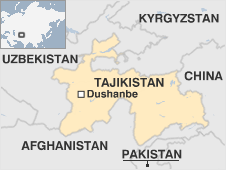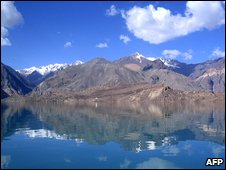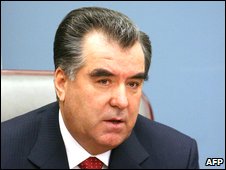 |
A former Soviet republic Tajikistan plunged into civil war almost as soon as it became independent from the Soviet Union in 1991.
A rugged mountainous country with lush valleys to the south and north it is Central Asia's poorest nation.
Overview
Tajiks are the country's largest ethnic group with Uzbeks making up a quarter of the population over half of which is employed in agriculture and just one-fifth in industry. Nearly half of Tajikistan's population is under 14 years of age.

Lake Sarez high up in Taijkistan's rugged Pamir mountains
|
The Tajik language is very close to Persian spoken in Iran and to Dari spoken in Afghanistan.
The five-year civil war between the Moscow-backed government and the Islamist-led opposition in which up to 50,000 people were killed and over one-tenth of the population fled the country ended in 1997 with a United Nations-brokered peace agreement.
Tajikistan has been accused by its neighbours of tolerating the presence of training camps for Islamist rebels on its territory an accusation which it has strongly denied.
The country's economy has never really recovered from the civil war and poverty is widespread. Almost half of Tajikistan's GDP is earned by migrants working abroad especially in Russia but the recession in 2009 threatened that income. The country is also dependent on oil and gas imports.
The republic has relied heavily on Russian assistance to counter continuing security problems and cope with the dire economic situation. Russian forces guarded sections of the border with Afghanistan until mid-2005 when their withdrawal was completed and the task handed over to Tajik border guards.
Skirmishes with drug smugglers crossing illegally from Afghanistan occur regularly as Tajikistan is the first stop on the drugs route from there to Russia and the West.
In October 2004 Russia formally opened a military base in Dushanbe where several thousand troops will be stationed. It also took back control over a former Soviet space monitoring centre at Nurek. These developments were widely seen as a sign of Russia's wish to counter increased US influence in Central Asia.
Facts
- Population: 7 million (UN 2009)
- Capital: Dushanbe
- Area: 143,100 sq km (55,251 sq miles)
- Major languages: Tajik Uzbek Russian
- Major religion: Islam
- Life expectancy: 64 years (men) 69 years (women) (UN)
- Monetary unit: 1 Tajik somoni = 100 dirams
- Main exports: Aluminium electricity cotton fruit textiles
- GNI per capita: US $600 (World Bank 2008)
- Internet domain: .tj
- International dialling code: +992
Leaders
President: Emomali Sharipovich Rakhmon (Rakhmonov)
Emomali Rakhmon a former cotton farm boss was elected chairman of the Supreme Council of Tajikistan in 1992 after the country's first post-Soviet leader Rahmon Nabiyev was forced to resign.

Emomali Rakhmon - now in third term as president
|
He was elected president in 1994 and re-elected in 1999 when his term was extended to seven years.
In 2006 he won a third term in office in an election which international observers said was neither free nor fair. Opposition parties boycotted the vote dismissing it as a Soviet-style staged attempt at democracy.
Mr Rakhmon was instrumental in the pro-Communist effort to remove Islamist rebels from Dushanbe in the early 1990s. He led troops from southern Kulob District and supported the intervention of forces from other former Soviet republics. After years of civil war and violence some stability returned to Tajikistan.
The president is not known for tolerating dissent. His People's Democratic Party holds virtually all seats in parliament. Western observers said the 2005 legislative elections had failed to meet international standards.
Mr Rakhmon does retain substantial public support. Tajikistan is still very poor but many people are thankful they no longer have to face the civil war of the 1990s which killed tens of thousands and caused more than 10% of the population to flee the country.
Mr Rakhmon was born in 1952. His surname was Rakhmonov until 2007 when he ordered his countrymen to drop Russian-style surnames in a break with the nation's Soviet past. He removed the Russian suffix "-ov" from his surname saying this made him sound more Tajik.
Media
Television is the most-popular medium. Alongside the state broadcaster there are more than a dozen local and regional private TVs most of them entertainment-based.
Russian and other foreign stations are carried via cable and satellite. But in remote and mountainous areas viewing is restricted by limited power supplies.
There are more than 200 registered papers but no dailies. Some titles are government-owned and others are linked to political movements. Privately-owned papers have a very small readership.
Radio is the only broadcast medium that can be received in all areas of the country. Private stations operate alongside state-run networks. Dushanbe's first private station opened in September 2002 after a four-year wait for its licence.
Media rights organisations report that although provided for in the constitution press freedom is not widely respected.
However Reporters Without Borders (RSF) ranked Tajikistan in its 2008 Press Freedom Index as having the highest level of media freedom among the five Central Asian states.
There were around 19,500 internet users by 2007 (ITU figure).
The press
- Minbar-i Khalq - published by People's Democratic Party
- Jumhuriyat - government-owned published in Tajik three times a week
- Khalq Ovozi - government-owned published in Uzbek three times a week
- Narodnaya Gazeta - government-owned published in Russian three times a week
- Neru-i Sukhan - privately-owned weekly
- Nido-i Ranjbar - Tajik-language weekly published by the Communist Party
- Golos Tajikistana - Russian-language weekly published by the Communist Party
- Tojikiston - privately-owned Tajik-language weekly
- Najot - weekly published by Islamic Rebirth Party
Television
- Tajik TV - state-run; operates Tajik TV first channel Safina youth channel news channel Jahonnamo children's network Bahoriston and regional channels
- Soghd TV - state-run regional station in north
- Khatlon TV - state-run regional station in south
- SMT (Independent Television of Tajikistan) - private Dushanbe
Radio
- Tajik Radio - state-run operates Radio Tajikistan Radio Sado-i Dushanbe (Voice of Dushanbe) culture network Radio Farhang external service Ovoz-i Tojik
- Radio Imruz - private available in all regions
- Radio Vatan - Dushanbe private
- Radio Tiroz - Khujand private
- Radio Asia-Plus - Dushanbe private
News agencies
- Asia-Plus - private English-language pages
- Khovar - state-run
- Varorud - private
-
Avesta - private English-language pages
AFRICA | ASIA-PACIFIC | AMERICAS | EUROPE | MIDDLEEAST | SOUTHASIA
Mauritania Mauritius Morocco Mozambique Namibia Niger Nigeria Republic-of-congo Rwanda Sao-tome-and-principe Senegal Seychelles Sierra-leone Somalia South-africa Sudan Swaziland Tanzania The-gambia Togo Tunisia Uganda zambia Zimbabwe Australia Brunei Burma Cambodia China East-timor Fiji Indonesia Japan Kazakhstan Kiribati Kyrgyzstan Laos Malaysia Marshall-islands Micronesia Mongolia Nauru New-zealand North-korea Palau Papua-new-guinea Samoa Singapore Solomon-islands South-korea Taiwan Tajikistan Thailand The-philippines Tonga Turkmenistan Tuvalu Uzbekistan Vanuatu Vietnam Antigua-and-barbuda Argentina Bahamas Barbados Belize Bolivia Brazil Canada Chile Colombia Costa-rica Cuba Dominica Dominican-republic Ecuador El-salvador Grenada Guatemala GuyanaHaiti Honduras Jamaica Mexico Nicaragua Panama Paraguay Peru St-kitts-and-nevis St-lucia St-vincent-and-the-grenadines Suriname Trinidad-and-tobago United-states-of-america Uruguay Venezuela Albania Andorra Armenia Austria Azerbaijan Belarus Belgium Bosnia-hercegovina Bulgaria Croatia Cyprus Czech-republic Denmark Estonia Finland France Georgia Germany Greece Hungary Iceland Ireland Italy Latvia Liechtenstein Lithuania Luxembourg Macedonia Malta Moldova Monaco Montenegro Norway Poland Portugal Russia San-marino Serbia Slovakia Slovenia Spain Sweden Switzerland The-netherlands Turkey Ukraine United-kingdom Vatican Algeria Egypt Iran Iraq Israel-and-palestinian-territories Jordan Kuwait Lebanon Libya Mauritania Oman Saudi-arabia Sudan Syria Tunisia United-arab-emirates Yemen Afghanistan Bangladesh Bhutan India Nepal Pakistan Sri-Lanka The-Maldives

